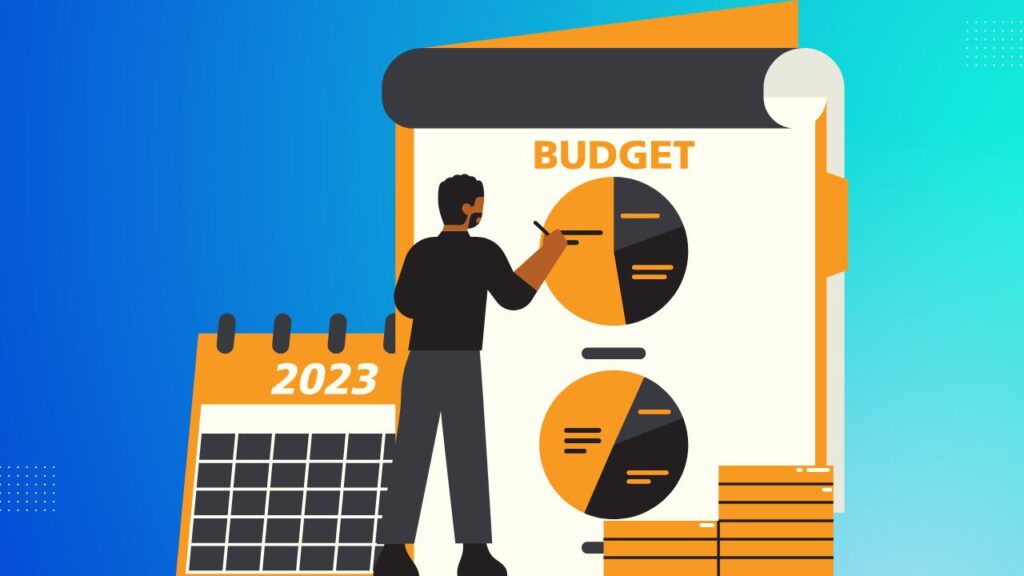I don’t know about you, but I always find myself getting caught up in the excitement and cheer of the season, which can sometimes mean overspending and putting myself in financial trouble.
According to a study by Deloitte, the average American spent over $1,500 on holiday-related expenses in 2022.
And as millennials, we’re often the demographic that’s hit the hardest financially during the holidays.
With so many expenses like gifts, travel, and food, it can be tough to keep our finances in check.
That’s why I wanted to share some tips and strategies for managing your finances during the holiday season like a boss. By planning, setting a budget, and being mindful of your credit, you can enjoy the holiday season without putting yourself in debt.
So let’s dive in and make this holiday season financially stress-free!
1. Set a Holiday Budget

Let’s talk about setting a holiday budget like a boss.
It can be easy to overspend during the holiday season, but with a little planning and discipline, we can avoid financial stress and stay within our means.
1.1 Establishing a budget
- Determine your total holiday budget: Start by deciding how much you can realistically afford to spend on holiday expenses. This can be based on your income, savings, and financial goals. According to a survey by Bankrate, the average American plans to spend $998 on holiday-related expenses.
- Break down your budget: Once you have your total budget in mind, break it down into categories such as gifts, travel, food, and decorations. This will help you allocate your funds and stay on track.
- Consider any non-gift expenses: Don’t forget about other expenses like holiday parties, charitable donations, and extra childcare costs. These can quickly add up and impact your overall budget.
1.2 Sticking to the budget
- Avoid impulsive purchases: It can be tempting to buy every shiny new thing we see, but try to resist the urge. Stick to your list and avoid impulse purchases that can throw off your budget.
- Shop with a list: Speaking of lists, make sure to create a shopping list for gifts and other holiday items. This will help you stay organized and focused while shopping.
- Use cash instead of credit cards: It’s easy to overspend with credit cards, so consider using cash or a debit card for holiday purchases. Set a spending limit for each shopping trip and stick to it.
Here’s a table to help break down a sample holiday budget:
| Category | Estimated Cost |
| Gifts | $500 |
| Travel | $200 |
| Food | $150 |
| Decorations | $50 |
| Holiday parties | $100 |
| Charitable donations | $50 |
| Childcare | $50 |
| Total Budget | $1,100 |
By setting a budget and sticking to it, we can manage our finances like a boss during the holiday season.
Happy budgeting!
2. Plan for Expenses

By anticipating our expenses and creating a timeline, we can avoid last-minute panic and overspending.
2.1 Identify expected expenses
- Gifts: Make a list of all the people you plan to buy gifts for and how much you plan to spend on each. According to the National Retail Federation, the average person plans to buy gifts for nine people and spend a total of $650 on gifts.
- Travel expenses: If you plan to travel during the holidays, factor in the cost of transportation, lodging, and any other related expenses. According to AAA, the average cost of a Thanksgiving trip is $478.
- Food and entertainment: Don’t forget about holiday meals, parties, and other entertainment expenses. Plan for these ahead of time to avoid overspending.
2.2 Create a timeline
- Determine when bills are due: Make sure to pay bills and other financial obligations on time to avoid late fees and interest charges. Mark these dates on a calendar or in a planner.
- Plan for early shopping: Start shopping for gifts and other holiday items early to take advantage of sales and avoid last-minute panic buying. According to a survey by the National Retail Federation, 42% of holiday shoppers start shopping before November.
- Plan for holiday travel: If you plan to travel during the holidays, book your tickets and accommodations early to get the best deals. Also, plan for any related expenses like pet-sitting or airport parking.
Here’s a table to help plan for holiday expenses:
| Expense | Estimated Cost | Timeline |
| Gifts | $650 | Start shopping in October |
| Travel | $478 | Book in September/October |
| Food and entertainment | $200 | Plan menu in November |
By identifying expected expenses and creating a timeline, we can manage our finances like a boss during the holiday season.
Happy planning!
3. Find Creative Ways to Save

By taking advantage of sales, shopping secondhand, and DIY gifts and decorations, we can keep our expenses in check and manage our finances like a boss.
3.1 Take advantage of sales
- Black Friday and Cyber Monday: These two days are famous for the sales of all kinds of products. In 2020, Cyber Monday sales reached a record $10.8 billion, according to Adobe Analytics.
- Shopping during off-peak hours: Many stores offer discounts during off-peak hours, such as early mornings or late evenings. Take advantage of these deals to save money.
3.2 Shop secondhand
- Consignment shops: Consignment shops offer gently used clothing and other items at a fraction of the original cost. According to ThredUp, the secondhand market is expected to reach $77 billion by 2025.
- Online marketplaces: Online marketplaces like eBay and Facebook Marketplace are great places to find secondhand items. In fact, according to Facebook, 84% of its users have bought or sold something on the platform.
3.3 DIY Gifts and Decorations
- Homemade gifts: Making gifts by hand is a great way to save money and add a personal touch. According to a survey by Etsy, 83% of millennials have either made or received a handmade gift.
- Decorations: Creating your own holiday decorations can be a fun and budget-friendly way to get in the festive spirit. Pinterest is a great resource for DIY holiday decor ideas.
Here’s a table to summarize creative ways to save during the holiday season:
| Method | Savings | Examples |
| Take advantage of sales | Up to 50% off | Black Friday, Cyber Monday |
| Shop secondhand | Up to 90% off | Consignment shops, online marketplaces |
| DIY gifts and decorations | Up to 80% off | Homemade gifts, decorations |
By finding creative ways to save during the holiday season, we can manage our finances like a boss while still enjoying the festivities.
Happy shopping and crafting!
4. Be Mindful of Your Credit

Let’s talk about being mindful of your credit during the holiday season.
This is important because overspending can lead to credit card debt and high-interest rates.
It’s also a good idea to monitor your credit score to avoid any surprises.
A. To avoid overspending, try to stick to your budget and avoid impulse purchases.
Credit card debt can accumulate quickly, and high-interest rates can make it difficult to pay off your balance.
If you do use your credit card, make sure you can pay off the balance in full to avoid interest charges.
B. Monitoring your credit score is important all year round, but especially during the holiday season when you may be using your credit card more often.
Regularly check your credit report to make sure there are no errors or fraudulent activity.
It’s also a good idea to avoid opening new credit accounts, as this can temporarily lower your credit score.
According to a study by LendingTree, the average credit card debt per consumer during the 2022 holiday season was $1,549.
That’s a lot of money to pay off!
By being mindful of your credit and avoiding overspending, you can avoid accumulating unnecessary debt and enjoy the holiday season without any financial stress.
5. Manage Post-Holiday Finances

Managing your finances during the holiday season can be tricky, but it’s important to take control of your spending to avoid overspending and getting into debt.
Let’s talk about managing your finances post-holiday season.
5.1 Review your budget
It’s important to review your budget after the holiday season to see how well you stuck to it.
Take a look at your spending and identify areas where you can improve for next year.
- One way to evaluate your budget is to compare your actual spending to your planned spending. This will give you an idea of where you might have overspent and where you can make adjustments for next year.
- You can also consider keeping track of your holiday spending throughout the season so that you have a better understanding of where your money is going.
5.2 Pay off holiday debt
If you accumulated debt over the holiday season, it’s important to create a plan to pay it off as soon as possible.
- Consider making a list of your debts and prioritize paying off those with the highest interest rates first. This can help you save money in the long run.
- Another option is to look into balance transfers. This involves transferring your high-interest credit card balances to a card with a lower interest rate, allowing you to pay off your debt more quickly and save on interest charges.
5.3 Plan for next year
Finally, it’s a good idea to start planning and saving for next year’s holiday season.
- You can start by evaluating your budget and expenses from the previous year and making adjustments based on what worked and what didn’t.
- Set up a separate savings account specifically for holiday expenses and start contributing to it each month. This can help you avoid accumulating debt next year and allow you to enjoy the holiday season without financial stress.
Bottom Line…
We’ve covered a lot of ground today on managing your finances during the holiday season.
It’s important to keep in mind that overspending during the holidays can lead to long-term financial stress, but with a little bit of planning and creativity, you can enjoy the holidays without breaking the bank.
Remember, setting a holiday budget, planning ahead for expenses, finding creative ways to save, and being mindful of your credit can all help you stay on track financially.
And don’t forget to review your budget and pay off any holiday debt on time.
According to a survey by NerdWallet, in 2020, Americans planned to spend an average of $998 on holiday gifts alone.
That’s a lot of money!
But with some smart financial planning, you can make sure you’re not overspending and creating debt that will last long after the holidays are over.
I hope you found these tips helpful and are ready to manage your finances like a boss during the holiday season.
Happy holidays and happy budgeting!
